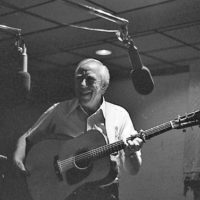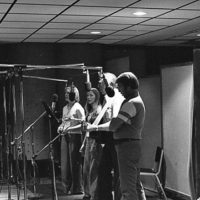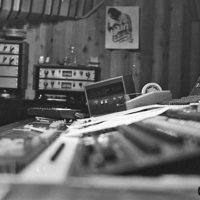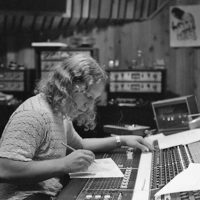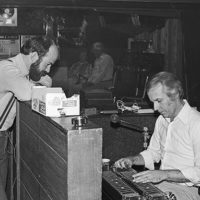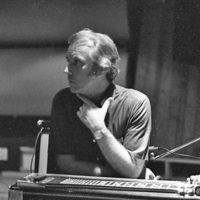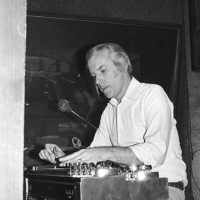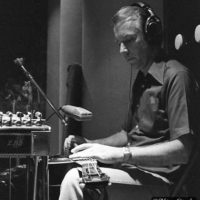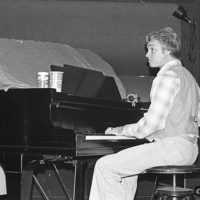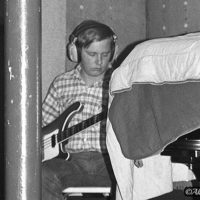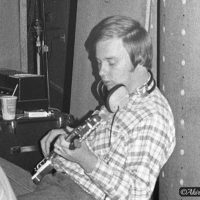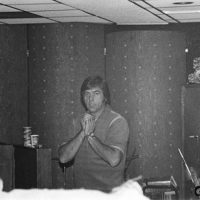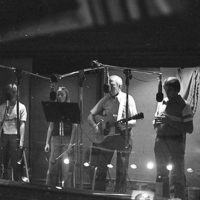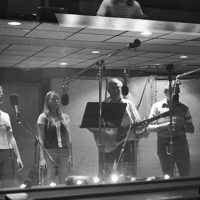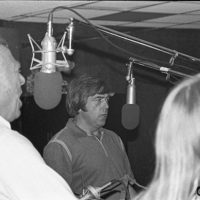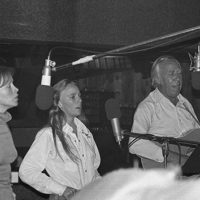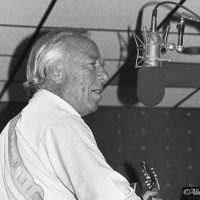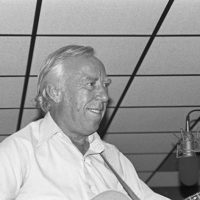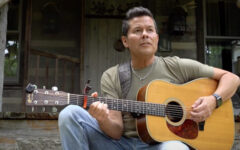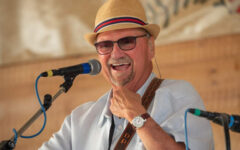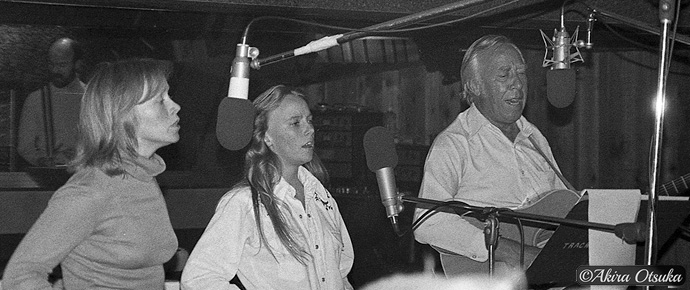
Deb Shuffler Corley, Jennie Shuffler Brittain and George Shuffler at Track Recorders – photo © Akira Otsuka
Akira Otsuka has shared another of his galleries of archived photographs from the 1970s, this time of George Shuffler and his family recording at Track Recorders in Silver Spring, MD. Recording dates are not certain, but the sessions were for the album Gospel Pickin’, released on Rebel Records (SLP 1575) in 1977.
Shuffler was among the very earliest guitarists to play lead in bluegrass while he was with The Stanley Brothers. During some of the lean years in the early 1960s, they would go out with only Carter, Ralph, and George, with Shuffler playing either bass or guitar as the song required. His crosspicking style, playing the melody on guitar in much the same way that it was played with three fingers on the banjo, has become as important a part of bluegrass music as the singing of the Stanley Brothers.
Of course George was also an excellent bassist, as Tom Gray of Country Gentlemen and Seldom Scene fame recalls.
“George Shuffler played such a driving, walking bass line, he became my hero. Listen to those first few Mercury recordings of the Stanley Brothers, songs like This Weary Heart You Stole Away or Our Last Goodbye. If you’re not moved by the groove, you’re dead!
Our other musical hero, John Duffey said, ‘George had greater impact on the Stanley’s music when he played bass than when he played guitar.’
Playing the same circuit for years, George and I became good friends, and he heard me trying to play like him. I think he enjoyed the flattery.
If George ever offered you a piece of candy, DON’T EAT IT! George was a great practical jokester who loved to embarrass people.”
Gospel Pickin’ featured George on guitar and vocals, accompanied by his two daughters, Jennie and Deb, singing along, and his son Steve on bass. The girls, now Jennie Shuffler Brittain and Deb Shuffler Corley, put together these memories of the sessions, plus a concise history of how the Shuffler family came to record together.
It’s a lovely reminiscence and an inside look at a true bluegrass hero.
“Looking through Akira’s photos from this recording session brought back wonderful memories, and sent our hearts and thoughts in many directions…
We always knew Dad as loving, kind, fun, and funny; he was never shy about expressing his love for us.
He was a man among men, but at home he loved just being Daddy. Professionally, however, we only knew him as bass and guitar player for Carter and Ralph, the Stanley Brothers. Our ‘normal’ was having him home for a few days, always dreading the fact he would soon have to leave to go back on the road. Both he and Mom worked hard to keep the focus on family, and always encouraged us to enjoy and appreciate any time we were together.
When Dad was home, he wanted to be HOME. He loved the music, but he didn’t like life on the road and wanted to be home ‘with Mamma and the babies.’ The guitar stayed behind the couch, and right before he had to leave, he would take it out just long enough to change the strings.
Dad was never one to bring his work home. He would share with us about friends he had made, but he didn’t talk about where he had been and all he had done. We didn’t learn until much later that he had played Carnegie Hall, or the Royal Albert Hall in London during the Stanley Brothers’ tour of Europe in early spring of 1966.
Dad was with Carter when he passed away December 1, 1966. That was a tremendous loss, and truly made an impact on Dad. He continued with Ralph for a time, and then worked with Don Reno and Bill Harrell from 1967-69. There was no doubt he was restless and wanted to be home, so we were elated when, in late 1969, he came off the road ‘for good.’
Throughout Dad’s career in bluegrass music, Mom fulfilled their vow to raise us five kids in church. We were part of the youth choir, and one Sunday he heard our little choir sing. He turned to Mom and whispered, ‘Whose voices am I hearing?’ She answered, ‘They’re your daughters.’
That afternoon, the guitar came out from behind the couch and he called us into the living room.
The first song we ever sang together was How Tedious and Tasteless the Hours. To this day it remains one of our favorite hymns. We were invited to sing for the anniversary celebration at a local church, and from there, other churches began extending invitations as well. By this time, one of Dad’s brothers, Uncle Dude, had joined us singing bass, and our brother Steve was playing bass guitar.
Dude’s son, Joe Eddie, soon joined on drums.
Invitations continued to come in from neighboring counties and states, and in 1977, Dad’s long-time friend, Dick Freeland of Rebel Records, took a chance on us and recorded our first album at his studio in Silver Spring, Maryland. Mr. Freeland and his son Ronnie were gracious and helpful, since most of us were brand new to this experience! Von Hohn played piano, and the incomparable Mike Auldridge was on dobro.
To see Akira’s photos of this session takes us back to that time and place, when these talented, seasoned professionals made us feel welcomed and appreciated. Over the next 22 years, we were blessed to travel to many states and a variety of venues. We made lasting friendships with wonderful people we could never have met otherwise. But it is, without question, the gift of being up there with Dad, singing for the Lord, that is dearest to our hearts. We enjoyed traveling and singing together through 1994.
In the spring of 2014, as Dad was nearing his Homegoing, we sat on each side of his bed, talking and reminiscing. He began singing How Tedious and Tasteless the Hours. We joined in with harmony, and were immediately taken back to that Sunday in the living room where we sang together for the first time. God’s precious gift to us was the blessing of singing that same beautiful hymn with Dad one last time. His voice was clear and strong, his testimony solid and sure.
Just as he had a vision about his role in bluegrass, and then in Gospel music, he most certainly envisioned Who he was singing about and where he was going. There is no better legacy.”
Gospel Pickin’ is long out of print, though it can be heard on YouTube.
Many thanks to Akira, Tom, Jennie, and Deb for their contributions.

